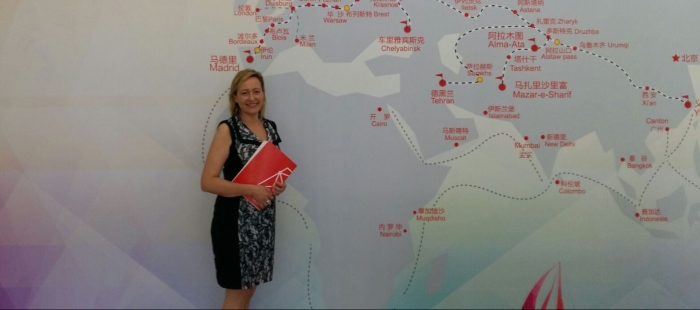The line manager and counsellor Gaston, are committed to Zaragoza becoming “an important centre of business growth”
Within a year, the so-called Silk Train, which links the Chinese city of Yiwu with Madrid in a long commercial merchandise route, will stop in the Aragonese capital. This has been confirmed by the president of Yiwu Timex Industrial Investment Corporation, Alex Zhang, the line manager, after his interview with councillor Marta Gastón, held in the Chinese city this morning. Gastón has travelled to the Zhejiang region to strengthen commercial links with this region which is a stop on the train and is one of the key areas of interest for Aragon. After the meeting, Zhang confirmed that Zaragoza is “an important centre of business growth,” with top level logistics and distribution platforms, connections with the ports of Barcelona and Valencia, and an airport nearby. Zhang confirmed that the “aim is to have a stop in Zargoza within six months and a year, we’re working very hard on it.” The Chinese official believes the Zaragoza (Plaza) Logistics Platform could provide a return journey of goods to China, calling the exchange a “win-win” for both parties.
After the announcement, the councillor for Economy, Industry and Employment was satisfied “that the strategic conditions and logistics development of Aragon have been well understood by the administrative, political and business managers of this centre of world trade development.” Both from the industrial and commercial point of view, Yiwu is a centre for a large number of goods exchange on the planet. The so-called Silk Train is one of the factors making the region even more dynamic and has continued to Madrid (entering via Irún) since 2014. When it arrives to currently the only stop in Spain, the train can be carrying a total of 42 containers, 750 metres in length and stops twice a week.
At the moment, in its journey of more than 13,000 kilometres, it crosses eight countries -China, Kazakhstan, Russia, Belarus, Poland, Germany, France and Spain-, in addition to other branches open to Great Britain and Iran, which serve as both the destination of the goods that depart from Yiwu as well as those that would eventually leave the Aragonese capital. Its route covers more kilometres than the Transiberian railway or Orient Express. The Silk Train completes its route in 18 days.
In addition, the final destination of Yiwu (starting from Spain) continues to attract the interest of Aragonese companies, councillor Gastón reminded us, given that the city houses the largest Chinese distribution centre in the world, a market from which merchandise is exported to multiple sectors in 216 countries around the world and located next to the largest traffic port on the planet, Ningbo (China).
Those responsible for the line have accompanied the official Aragonese delegation on a tour of the railway terminal and the loading and unloading area of goods, together with other managers of the local Foreign Office and the Yiwu International Land Port Grop Co. before visiting the Yiwu Timex Industrial facilities.
Following this, the councillor has continued with her busy trip itinerary with a visit to the town of Yiting which has started various development projects, both in urban development and infrastructure and new services under the national development plan of the country, knowing the possibilities that these projects offer to Aragonese companies. Gastón has met with the political leaders of the area and with the members of the Foundation’s Board for the Exchange between Yiwu and Spain.
Footer
Copyright © 2018
All rights reserved
Phone: (+34) 976 20 38 30
Email: info@aragonplataformalogistica.com
Legal Notice | Privacy Policy | Cookies Policy | Whistleblowing Channel


